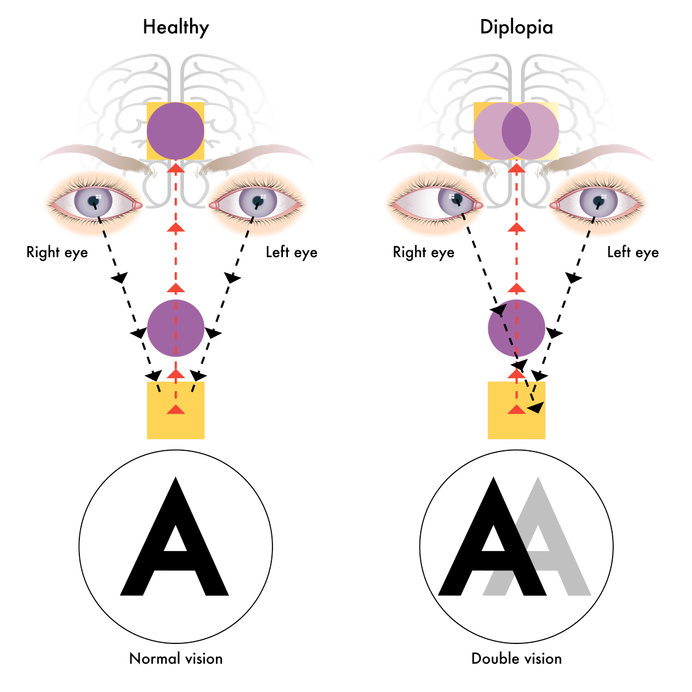Double vision or “diplopia” can be an extremely concerning experience for someone, especially when it occurs suddenly. Double vision can range in severity and have a variety of causes, from harmless to very serious. An important distinction in classifying double vision is whether it is with one eye only “monocular”, or both eyes together, “binocular”.
Binocular double vision, commonly referred to simply as double vision, occurs when a person’s eyes fail to work together properly, and can be resolved by closing one eye. Our eyes rely on several highly coordinated muscles and nerves to keep each eye focused on the same object. When properly aligned, each eye focuses and aims at the same object, which our brain interprets as single vision. If this coordination is disrupted, it can result in our two eyes focusing in different places. This causes each eye to see a different image, resulting in a person experiencing double vision. Double vision is often categorized into “intermittent”, meaning it happens occasionally and resolves, or “constant”, meaning it occurs and does not go away.
Intermittent double vision is more common than constant double vision, and usually is the result of a momentary loss of muscle coordination. We all have an eye “posture” that our eyes will naturally tend toward without constant energy and visual feedback. Most people’s eyes tend to point slightly outwards, but some also tend inwards. This phenomenon is slightly different for everyone, and we all have our own unique ability to overcome this tendency and maintain single vision. If someone’s eye posture is too great for them to overcome, double vision can result. This commonly occurs when a person is fatigued, or putting their eyes through more than they can easily handle. Common causes include prolonged near or computer work, lack of sleep, and certain visual motor problems. The ability to adequately maintain comfortable single vision can also deteriorate simply due to age.
Also read about Age-Related Macular Degeneration (AMD)
Constant or sudden double vision is always a reason to see a doctor right away. When a person suddenly loses the ability to maintain single vision, it can indicate a structural or neurological problem. Our eyes rely on several nerves and muscles working in concert to perform properly. When one of these loses its ability to keep the eye in place, or move it efficiently, it can result in a sudden eye turn or the inability to move the eye at all. Some causes of sudden constant double vision include areas of the brain losing oxygen, lesions that affect normal function, and neurological diseases.
Monocular double vision means that when the person closes an eye, they still see more than one image in one or both of their eyes. This is generally less concerning, and usually a byproduct of something happening with the optics of the eye, rather than muscular or neurological. In order for us to achieve normal vision, it is necessary for every part of the eye to work properly. Monocular double vision most commonly comes from disorders of the cornea, the front window of the eye. The cornea is responsible for bending most of the light as it enters the eye, and irregularities to this surface can result in distorted, double, and even triple vision. People can also sometimes experience this type of double vision simply from dry eye.
Treatment for double vision includes first identifying the underlying cause. If the double vision is monocular, treatments aimed at improving the health and optics of the eye are recommended. This may be as simple as the regular use of topical lubricating drops, or custom contact lenses. Binocular diplopia, if sudden and constant, warrants a thorough work up and usually testing and treatment in a hospital setting. As the underlying condition is treated and managed, many patients will regain some, if not most, of their visual function. Intermittent double vision, as described above, can be managed with eye exercises and prism lenses. Eye exercises, also known as vision therapy, can help some patients improve their ability to coordinate their eyes, and allow them to use their eyes together more effectively. Prism lenses can also be very helpful for patients that are unable to coordinate their eyes on their own. Prisms work by moving the image each eye sees to the same place, mimicking what our eyes naturally did prior. Prism glasses can also go beyond treating people with intermittent double vision. In cases where patients have lost the ability to move an eye, or have a constant eye turn, prisms can often be placed in such a way to help that person regain single vision as well.
If you or someone you know is experiencing new double vision, it is important to talk to a doctor, eye or otherwise, as soon as possible. For more information, see the links below.
Save up to 80% on the cost of your prescriptions at your local pharmacy with EasyDrugCard.com. Download your free drug card and begin saving today.
References:
https://www.allaboutvision.com/conditions/double-vision.htm
https://www.ncbi.nlm.nih.gov/books/NBK441905/
https://www.allaboutvision.com/eyewear/eyeglasses/prism-glasses-double-vision/












